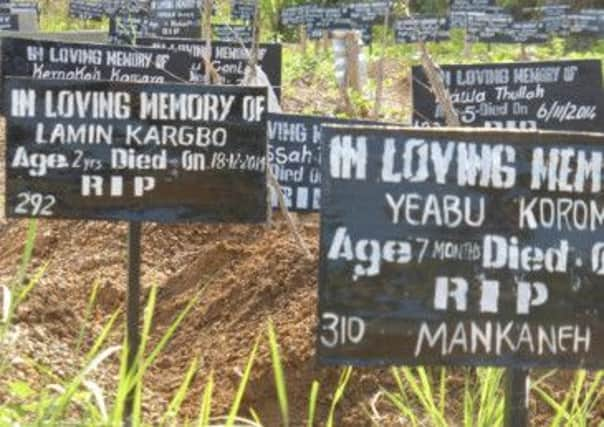‘Things are not going well in our fight against killer virus’


Dr James Meiring, of Cabus, is now halfway through a five-week voluntary service mission in Makeni , Sierra Leone, with the International Medical Corps charity.
Last week he reported on his blog the delight among his treatment centre team that “things looked like they were drying up, with no hot spots...no transmission”.
Advertisement
Hide AdAdvertisement
Hide AdSuspected Ebola cases had turned out to be malaria or presumed typhoid or meningitis – dangerous in themselves, but not in the same league as mega killer Ebola.


But this week things have taken a turn for the worse....
In his blog he writes: “Things were looking very good until one boy took a taxi from the capital city, Freetown, to his family home.
“Now, there are 21 Ebola virus positive patients confirmed in our ward and 27 high risk contacts in our suspect ward, with a school down the road full of other quarantined individuals, who are waiting to develop a fever.
“We had 17 admissions today. It requires the donning of the specialised protective gear by four people, a sweaty dance round the back of an ambulance, a protracted conversation through perspex glass, cannulation (putting a tube into a patient’s vein) with two pairs of gloves and depositing the patient in a bed.
Advertisement
Hide AdAdvertisement
Hide Ad“Then the cycle begins again, as the temperature rapidly rises up into the high 30s. One ambulance turned up today with eight patients inside, three under two years of age. But that is how this invisible killer goes about its business. It appears to travel underground. One boy with a fever takes a taxi ride back to his family home.
“As he gets sicker, more family are involved in his care. The burial happens and now his brothers, sisters, parents, grandparents, aunties, uncles, cousins and neighbours are queueing up to get a bed.
“An entire family who watched their son die are now all sat in a large tent, watching each other with the same diagnosis, get sicker.
“Every day those who can, walk to the fence, where we run through the same questions: Headache? Diarrhoea? Vomiting? Any blood? Eating/drinking? Followed by the inevitable temperature checks.
Advertisement
Hide AdAdvertisement
Hide Ad“Those who are fatigued and confined to their beds, lie there as strangers in yellow protective gear poke their tummies, feel their pulse, check how much fluid is in their vomit bucket and then attempt to offer some words of encouragement before moving on. The conveyor belt from the gate to triage to suspect to probable to confirmed case has to work. Whilst the level of care and compassion among the national and international staff is very high, communicating it is terribly difficult.
“Positive mothers are separated from their currently negative babies and housed in different tents and there is little comfort anyone can provide. The most important thing is that we remove the Ebola virus from the community. That means removing the people who carry the virus from the community.
“If that requires housing them all in the same tent, on a piece of land carved out of the African jungle, so be it. The reason it has to be like this is because the thing we are fighting is extremely difficult to eradicate.
“It’s been going on for 15 months now. Makeni thought it had cracked it but then one boy gets in a taxi and drives home, like a university student innocently travelling home for the holidays.
Advertisement
Hide AdAdvertisement
Hide Ad“Except this boy didn’t just bring a pile of dirty laundry and some unfinished assignments. He brought a cloud of spreading grief and sadness, that increases with every new family member that joins the positive brood.
“One boy takes a taxi ride home. Because of it, my next two weeks will be filled with assessing, rehydrating, re-testing, praying, hopefully discharging but unfortunately, most certainly burying.”
Follow James’ blog, Sheffield to Sierra Leone – http://sheffieldtosierra.org